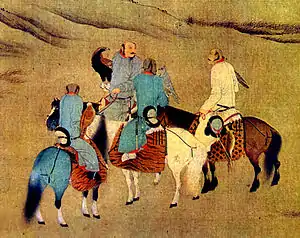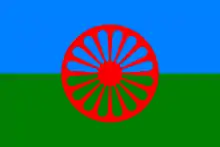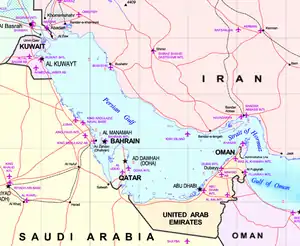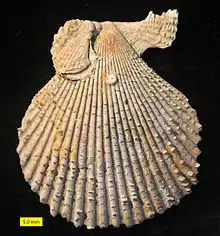| |
가!
- Roman: ga
- Imperative
- (명령형) 가!
- Go!
- Comparatives
|
가다
- Comparatives
- Imparative 가!
- go! [4]
Korean/Words/가람
Korean/Words/가랑비
가래
- RR: garae
- share
가르다
- to split or divide something isolated.
- to make way in air or water.
- to distinguish or discriminate right and wrong reasonably.
- Related terms
| Verbs | Nouns |
|---|---|
|
|
(under construction)
Korean/Words/가리다
거란


- Compounds
- 거란장 (거란場, -jang) [15]
- Relatives
- See also
- 땜 (ttaem, "tinkering, soldering")

Korean/Words/갈다
갈래
- what is split, divided, or separated.
- Related terms
- wikt: 가르다 (gareuda, "to split, divide")
- wikt: 가람 (garam, "river")
- wikt: 가래 (garae, "spade")
- wikt: 가리비 (garibi, "scallop")
- wikt: 갈기 (galgi, "shred, strip; mane")
- wikt: 갈비 (galbi, "rib")
- wikt: 갈퀴 (galkwi, "rake") [19]
- wikt: 갈퀴다 (galkwida, "to rake") [20]
- wikt: 할퀴다 (halkwida, "to scratch") [21]
- Compare 1
- The galley (ship) looks like a long extension of the Chinese pictogram 非, which is modelled after a pair of opposing wings of a bird.
- cf. Japanese ガレー (gare). See: w:jp: ガレー船
 The galley (ship), cf. Chinese pictogram 非.
The galley (ship), cf. Chinese pictogram 非.
- Compare 2
- The galley (kitchen), as seen in large airplanes or ships, also looks like a long extension of the Chinese pictogram 非 more often than not.
- cf. Japanese ギャレー (gyare). See: w:jp: ギャレー
 The galley (kitchen) of Airbus A340
The galley (kitchen) of Airbus A340 The galley (kitchen) of a cruise ship.
The galley (kitchen) of a cruise ship. The galley (kitchen) of the Royal Navy during the Second World War.
The galley (kitchen) of the Royal Navy during the Second World War.
- Compare 3
- The galley (for proofreading) is simply derived from a long array of typeset trays prior to the final pagination.
- cf. Japanese ゲラ (gera). See: w:jp: ゲラ刷り
- Compare 4
- The long gallery is used for displaying art collections, and so on.
.jpg.webp) Hardwick Hall's long gallery in the 1890s.
Hardwick Hall's long gallery in the 1890s.
갈퀴
- (galkwi, "rake")
|
hark #Netherlands ("rake") |
|
Harke #German ("rake") |
Korean/Words/같다
Korean/Words/거두다
Korean/Words/거르다
Korean/Words/거우르다
Korean/Words/거품
Korean/Words/거플
거흠
- RR: geoheum [23]
| Revision as of 11:43, 17 December 2006 (edit) |
|---|
거흠 • (geoheum)
|
- See also
Korean/Words/걷다
걸개
- RR: geolgae
- hanger
- Relatives
- 걸다 (geolda, "to hang")
- Associatives
- gallows, i.e., hanging tree
galga #Old English galge #Middle Dutch galg #Dutch Galgen #German Galge #Alemannic galge #West Frisian |
galge #Danish galgi #Icelandic galge #Norwegian galge #Swedish |
Korean/Words/걸다
Korean/Words/겨레
Korean/Words/겨울
Korean/Words/겸
Korean/Words/곁
Korean/Words/고랑
Korean/Words/고르다
Korean/Words/고리
Korean/Words/고비
고프다

- Synonyms
- 배고프다 (bae-) [27]
- Relatives
- Comparatives
|
|
Korean/Words/골
골개

- Roman: golgae
- Noun [32]
- Compounds
- Comparatives
- gorge #English [33]
- See more adapted from gorge #Translations (Sense: "deep, narrow passage with steep, rocky sides")
Albanian: gryka, grykë Estonian: kuru Finnish: kuru Galician: golga Italian: gola Javanese: curah Korean: 골짜기 (goljjagi) Persian: گلوگاه (galugâh) Portuguese: garganta Spanish: garganta |
- See also
- 골 (gol, "hollow, gully, valley")
- 골목 (golmog, "alley")
- 골짜기 (goljjagi, "gorge, ravine, gully")
곰
- RR: gom [34]
- bear
- (obsolete) hole, cavity
- Relatives
- Comparatives
- クマ #Japanese (kuma)
- bear
- cove, corner, recess
곰나루
- RR: gomnaru [35]
- old native name of 공주 (Gongju)
곰을 잡겠다
- 사냥꾼이 곰을 잡으려고 할 때 곰의 굴 안에 연기를 잔뜩 피워서 곰을 몰아낸다는 데서, 몹시 심하게 연기를 피움을 비유적으로 이르는 말.
구르다
- (intransitive) to roll over
- Relatives
- 굴리다 (gullida, transitive "to roll")
- 굴렁쇠 (gulleongsoe, "hoop")
- Comparatives
| |
- Associatives
- car #English
- carro #Italian
- carro #Portuguese
- carro #Soanish
- corona #English
- crown #English
- ころがる #Japanese (korogaru, "to roll over")
- くるま #Japanese (kuruma, "car, wheel" )
구름

- Comparatives
| Adapted from thunder #Translations |
|---|
- Toward the etymology of 구름 (gureum, "cloud")
- roll [56]
- rollen #German [59]
- to roll
- to thunder [60]
- grollen #German [61]
- to rumble, grumble, growl
- to roll, thunder
- grumeln #German (frequentative) [62]
- to grumble (make a low sound, as of a discontent person, an empty stomach, a distant thunderstorm)
- See also
- 구르다 (gureuda, "to roll" cf. German grollen)
- 우르렁 (ureureong, "grumbling" as of thunder)
- 으르렁 (eureureong, "growling" as of lions )
- 그르렁 (geureureong "gurgling" as of cats )
구리

- Roman: guri
- Noun
- Compounds
- 구리쇠 (-soe, lit. "copper metal")
- Relatives
- 구르다 (gureu-da, "to roll")
- 구불다 (gubul-da, "to be curved")
- 구부리다 (guburi-da, "to bend, make curved")
- 고리 (gori, "ring")
- Comparatives
|
구무
- Alternative forms
- 구멍 [gumeong] cf. German Gaumen
- 구메 [gume] cf. Low German gume, Middle Dutch gumme
- 구모 [gumo] cf. Old High German goumo
- Compounds
- 귓구무 [gwit-] earhole
- 입구무 [ip-] oral cavity
- 콧구무 [kot-] nostril
- Comparatives
- gum #English ("the flesh around the teeth")
- Gaumen #German ("palate, or the roof of the mouth; oral cavity") [72]
- gumme #Middle Dutch ("palate")
- gōma #Old English ("palate")
- goumo #Old High German ("palate")
- クマ #Japanese (kuma, "bear 熊; cove, cavity 隈") [73]
구부리다
- Relatives
- 굽다 (gub-da, "to be curved")
- 굽히다 (gubhid-da, "to bend, curve")
- 구르다 (gureu-da, "to roll")
- 구리 (guri, "copper")
- Comparatives
- copper #English
- cuprum #Latin ("copper")
- aes Cyprium #Latin (literally "Cyprian copper")
- Κύπρος #Ancient Greek (Kúpros, "Cyprus")
- See also
- cubare #Italian ("to kneel or lie down")
Korean/Words/구비
군
- RR: gun
君
- See also
- 황제 (黃帝, hwangje, "king of kings, emperor of emperors")
Korean/Words/굳
Korean/Words/굴
Korean/Words/굴리다
Korean/Words/굼
Korean/Words/굽
Korean/Words/굽다
Korean/Words/굿
Korean/Words/궁
Korean/Words/귀
귀고리

- RR: gwigori [78]
- Synonyms
- 귀걸이 (gwigeol-i, "eardrop")
- 귀엣고리 (gwiesgori, "earring") [79]
- 귀여골 (gwiyeogol), 귀여ㅅ골 (gwiyeo's gol), 귀예골 (gwiyegol), 귀예ㅅ골 (gwiye's gol), etc.
- more...
- *귀골 (gwigol, "earring"), *희골 (hvigol, "sun ring"), *희여골 (hviyeogol, "sun's ring"), etc. [80]
- Hypernyms
- Hyponyms
- 해귀엣골 (hae-gwiesgol, "sun halo", literally, "sun earring")
- Sino-Koreans
- 이 (珥, i)
- cf. 일이 [82] (日珥 #Chinese, il-i, "solar prominence")
Korean/Words/그림
Korean/Words/글
Korean/Words/긁다
Korean/Words/기르다
Korean/Words/기름
Korean/Words/기리다
Korean/Words/길
- ↑ https://ko.dict.naver.com/#/search?query=가다
- ↑ https://en.wiktionary.org/wiki/가다
- ↑
- ↑ Cognates
- ↑ 네이버: 가르다
- 쪼개거나 나누어 따로따로 되게 하다.
- 물체가 공기나 물을 양옆으로 열며 움직이다.
- 옳고 그름을 따져서 구분하다.
- ↑ Wikt: 가르다
- to separate
- to cut or slice through
- to make the difference between defeat and victory
- ↑ Likely slidings:
- 가르다
- 가리다
- 거르다
- 고르다
- ↑
 Fossil scallop
Fossil scallop
- ↑
- English: Gypsy Airs
- Spanish: Aires gitanos
- ↑ performed by Jean-Claude Féret (violin) and Christine Féret (piano)
- ↑
- Brynner felt a strong personal connection to the Romani people; in 1977, Brynner was named honorary president of the International Romani Union, a title that he kept until his death.
- He claimed that he was born "Taidje Khan" of a Mongol father and Roma mother, on the Russian island of Sakhalin. He occasionally referred to himself as Julius Briner,Jules Bryner or Youl Bryner.
- ↑ Elements
- 契 (부족이름 글, "tribal name")
- 丹 (정성스러울 란, “devotion”).
- ↑ https://ko.dict.naver.com/#/search?query=거란
- ↑ https://en.wiktionary.org/wiki/거란
- ↑ 고려 시대에, 거란인 포로나 투항한 사람들을 집단으로 수용하던 곳. 각 도의 주, 현에 나누어 보내 땅을 주고 농사를 지으며 모여 살게 하였는데, 고려 백성으로서의 이들에 대한 대우는 천민에 가까웠다.
However, this may be untrue. Regardless of the name, Koreans would have done good to Balhae people as defeated by Khitans. - ↑ Abaoji (872 – 926), posthumously known as Emperor Taizu of Liao, was a Khitan leader and founder of the Liao dynasty (907–926).
- ↑ Naver: 갈래
- 하나에서 둘 이상으로 갈라져 나간 낱낱의 부분이나 계통.
- (수량을 나타내는 말 뒤에 쓰여) 갈라진 낱낱을 세는 단위.
- ↑ Wikt: 갈래
- what is split off
- ↑ Compare:
- wikt: hark #Dutch "rake"
- wikt: Harke #German "rake"
- ↑ Compare:
- wikt: harken #Dutch "to rake"
- wikt: harken #English "to listen, hear, regard"
- wikt: harken #German "to rake"
- ↑ Naver: 할퀴다
- 손톱이나 날카로운 물건으로 긁어 상처를 내다.
- 휩쓸거나 스쳐 지나다.
- (생략)
- Comments
- A set of fingernails may well or ill serve as a rake in practice, even in raking on lifeless objects.
- ↑ "A galley proof is a printout of a document in which the margins are especially large. The idea is that you can read over what you have printed and have room for writing comments."
- ↑ Naver: 입-웃거흠
- ‘입천장’의 옛말.
- Not Available
- Naver: 웃거흠
- Naver: 거흠
- ↑
(derived from Old English goma, Old High German goumo "palate")Revision as of 05:39, 9 October 2007 (edit) (undo) (thank)
Visviva (talk | contribs) - ↑ https://ko.dict.naver.com/#/search?query=고프다
- ↑ https://en.wiktionary.org/wiki/고프다
- ↑ 배 속이 비어서 음식이 먹고 싶다.
- ↑ 먹는 것이 적어서 배가 차지 아니하다.
- ↑ 끼니를 거르다.
- ↑ 먹을 것이 없어서 배를 곯다.
- ↑ The vowel /u/ is quite exceptional.
- gulf (n.)
- late 14c., "profound depth," from Old French golf "a gulf, whirlpool," from Italian golfo "a gulf, a bay," from Late Latin colfos, from Greek kolpos "bay, gulf of the sea," earlier "trough between waves, fold of a loose garment," originally "bosom," the common notion being "curved shape."
- ↑ https://ko.dict.naver.com/#/search?query=골개
- ↑ (geography) A deep, narrow passage with steep, rocky sides, particularly one with a stream running through it; a ravine.
- ↑
- 포유강 식육목 곰과의 동물을 통틀어 이르는 말. 몸이 비대하며 다리가 굵고 짧다. 꼬리는 털에 가려져 보일 듯 말 듯 하다. 털은 갈색, 검은색 따위가 있으며 길고 거칠다. 깊은 산이나 북극 지방에 살며 나무에 잘 오르고 잡식성으로 대부분 겨울에는 굴속에서 겨울잠을 잔다. 대부분 북반구에 분포한다.
- (zoology) bear
- (obsolete) hole, compare 구무, Wikt:구멍|구멍]]
- ↑
- ‘공주2(충청남도의 동부 중앙에 있는 시)’(公州)의 옛 이름.
- ↑ Naver: 구르다1
- 바퀴처럼 돌면서 옮겨 가다.
- 마소나 수레 따위가 걷거나 달리거나 할 때에 출썩거리다.
- 포나 총 따위를 쏠 때, 반동으로 그 자체가 뒤로 되튀다.
- ↑ Wikt: 구르다
- (intransitive) to roll, turn (over and over)
- ↑
- A gyroscope
- A gyrocompass
- An autogyro
- ↑
- A swirling vortex.
- A circular current, especially a large-scale ocean current.
- A circular motion, or a circle described by a moving body; a turn or revolution; a circuit.
- Verb
- (intransitive) to whirl
- ↑
- I turn in a circle, wheel around, rotate.
- I circle, revolve around.
- ↑ from Ancient Greek γῦρος (gûros, "ring, circle")
- circle
- a circular motion
- a circuit, course, ring
- (by extension) place where horses are trained
- ↑ From the relevant verb?
- ring, circle
- ↑ From Middle French cylindre
- (geometry) A surface created by projecting a closed two-dimensional curve along an axis intersecting the plane of the curve.
- (geometry) A solid figure bounded by a cylinder and two parallel planes intersecting the cylinder.
- Any object in the form of a circular cylinder.
- A cylindrical cavity or chamber in a mechanism, such as the counterpart to a piston found in a piston-driven engine.
- (automotive) The space in which a piston travels inside a reciprocating engine or pump.
- A container in the form of a cylinder with rounded ends for storing pressurized gas; a gas cylinder.
- An early form of phonograph recording, made on a wax cylinder.
- The part of a revolver that contains chambers for the cartridges.
- (computing) The corresponding tracks on a vertical arrangement of disks in a disk drive considered as a unit of data capacity.
- ↑ From Latin cylindrus #Latin.
- (geometry) cylinder
- (automobiles) cylinder
- ↑ From Ancient Greek κύλινδρος (kúlindros).
- cylinder
- (by extension) a roller; a cylindrical stone for levelling the ground
- ↑ From κῠλίνδω (kulíndō, “I roll”)
- round stone, tumbler, marble (child's toy)
- roller, cylinder
- roll of a book, volume
- ↑
- I roll or wallow (intransitive)
- ↑ From Middle English carre, borrowed from Anglo-Norman carre, from Old Northern French (compare Old French char), from Latin carra, neuter plural of carrus (“four-wheeled baggage wagon”), or Gaulish origin.
- A wheeled vehicle that moves independently, with at least three wheels, powered mechanically, steered by a driver and mostly for personal transportation; a motorcar or automobile.
- - 12. (omitted)
- ↑ From Late Latin cyclus, from Ancient Greek κύκλος (kúklos), from Proto-Indo-European ? (“circle, wheel”). Doublet of wheel; see there for more.
- An interval of space or time in which one set of events or phenomena is completed.
- A complete rotation of anything.
- - 15. (omitted)
- ↑ You miss a thundercrack here.
- ↑ performed by the U.S. Navy Band
- ↑ https://ko.dict.naver.com/#/search?query=구름
- ↑ https://en.wiktionary.org/wiki/구름
- ↑ Onomatopoeia
- ↑ Onomatopoeia reduplicative
- ↑
- roll (v.)
- "Of sounds (such as thunder) somehow suggestive of a rolling ball, 1590s; of a drum from 1680s."
- ↑ frequentative
- ↑ The "roll" is what 구르다 is in itself.
- ↑ Cognates include Dutch rollen, English roll, etc.
- ↑ Der Donner rollt, oder, grollt.
- ↑ Cognates include Dutch grollen, English growl, etc.
- ↑ Cognates include Dutch gromelen, French grommeler, English grumble, etc.
- ↑ https://ko.dict.naver.com/#/search?query=구리
- ↑ https://en.wiktionary.org/wiki/구리
- ↑ From Greek: Κύπρος (Kúpros) "Cyprus"
- ↑ cf. Irish coire "cauldron"
- ↑ https://ko.dict.naver.com/#/search?query=구무
- ↑ https://en.wiktionary.org/wiki/구무
- ↑ (obsolete) hole, hollow, cavity
- ↑ (obsolete) vulva
- ↑ 남광우 편저. 교학 고어사전. 교학사. 1977. p. 140.
- ↑ While obsoleting this sense, German Gaumen below mainly means "palate" nowadays. Perhaps it may have begun with "oral cavity" (possibly together with "palate") and ended with "palate" alone anyway at last.
- ↑ https://ja.wikipedia.org/wiki/クマザサ (kumazasa)
- なお、「熊笹」という表記もよく見受けられるが、ほとんどは「隈笹」の誤字である。しかし、健康食品の中には、熊の絵を描いたり、熊の出るような深山の笹などと称して「熊笹」としているものもある(その「熊笹」が「隈笹」と同一かは、健康食品のパッケージの表記では普通わからない)。
- ↑ https://ko.dict.naver.com/#/search?query=구부리다
- ↑ https://en.wiktionary.org/wiki/구부리다
- ↑ To bend, curve
- ↑
- 친구나 아랫사람을 친근하게 부르거나 이르는 말.
- Wikt: 君 #Etymology_3 #Japanese
- Usage notes
- -kun is often used as a suffix when calling someone. The listener is lower or the same level in social position and is often, but not always, male.
- ↑
- 귓불에 다는 장식품. ≒귀걸이 ㆍ이식3(耳飾)ㆍ이환2(耳環).
- ↑ There are an unacountable number of obsolete alternative spellings.
- ↑
- Etymology
- English cycle, "From Late Latin cyclus, from Ancient Greek κύκλος (kúklos). Doublet of wheel," which is "from Old English hwēogol, hwēol."
- Comments
- The hubless cycle and circle may well relate to the earring and *귀골 (gwigol, "earring"), while the wheel with the hub to the sun's halo and *희여골 (hviyeogol, "sun's ring"). Then, cycle and wheel are hardly boublet.
- ↑ 어떤 사실이 이렇게도 저렇게도 해석됨을 이르는 말.
- A reality is interpreted in ways.
- ↑ 태양의 가에 일어나는 붉은 구름 기운. 귀고리같이 생겼다고 하여 관이(冠珥)라고도 하였으며, 예전에는 길한 조짐으로 여겼다.

